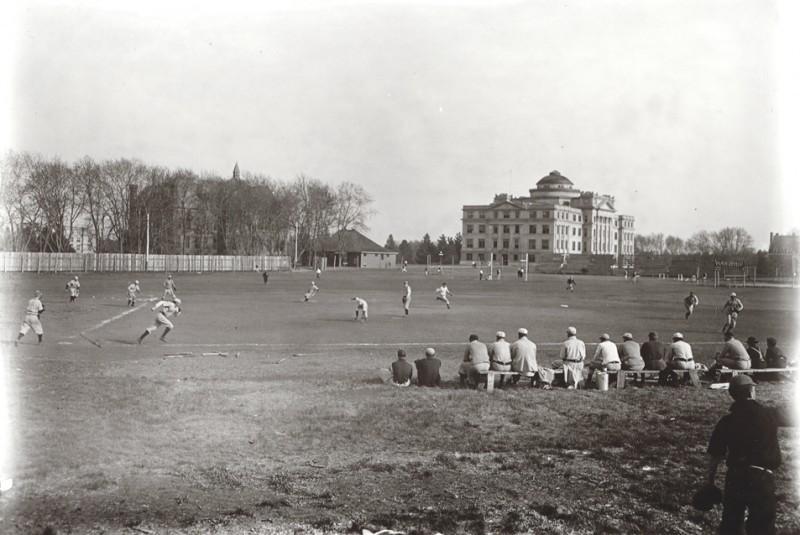Nichols: Title IX causes reverse discrimination
Courtesy photo: Iowa State University Library/Special Collections Department
The ISU baseball program dates back to 1892 including College World Series appearances in 1957 and 1970.
February 1, 2012
This has been an amazing year for Cyclone sports. Who can forget our football team’s great overtime victory of the Hawkeyes early in the season? Then there was the great upset of No. 2 Oklahoma State. Recently, our men’s basketball team upset No. 5 Kansas, as well as scoring a last-second buzzer-beater by Scott Christopherson versus, once again, Oklahoma State.
Iowa State has already clinched the Cy-Hawk series, currently leading 15-6 with the main wins in football and men’s and women’s basketball. But despite all this success, why is all of our focus on the main sports? What are Iowa State’s most successful sports programs?
In Iowa State’s history, the Cyclones have won 13 national championships. How many students here even know that? Wrestling has won eight, men’s gymnastics has won three, and men’s track and field has won two. How about conference championships? Since 1964, when the Big Eight Conference was legally changed to that name, Iowa State has won 77 conference championships (78 if you count the football team winning the Big 12 North in 2004). Only seven of them come from one of the “main sports” here.
Sports such as men’s gymnastics, baseball and swimming have been responsible for 16 championships, but they no longer exist. Most of the others come from our two most dominant sports, wrestling and track and field.
By far Iowa State’s most successful sport is wrestling. Even though the Cyclones have not won a national championship since 1987, they are consistently a contender. Wrestling has placed second 17 times, including a stretch under my grandfather, Dr. Harold Nichols, from 1962-1983, when they never finished lower than fourth. This is a sports dynasty that Cyclones can be proud of. This great tradition almost ceased to exist when Title IX was passed in 1972.
Title IX simply states, “No person in the United States shall, on the basis of sex, be excluded from participation in, be denied the benefits of, or be subjected to discrimination under any educated program or activity receiving Federal financial assistance … ,” under United States Code Section 20. Essentially, this piece of legislation prevents discrimination based on sex. During that time, civil rights and sex discrimination were big issues in universities.
Most people associate Title IX with athletics as the main point as it states that men and women should be treated equally when it comes to athletics. It states that athletic participation should be proportional to the student enrollment. I understand where they were originally coming from and there is nothing wrong with women playing sports. It is great seeing the success and attendance of women’s athletics, especially here at Iowa State with our basketball team.
The problem here, though, is with reverse discrimination. In order to be fair, basically the same number of players from each sex need to play. So sports such as basketball, soccer, track and gymnastics are fine because each sex can play them. Then you have the problem with football. Football is a male sport only. So in order to make it fair for the females, we either need to make a football team with the same number of females or cut smaller men’s sports programs.
Most colleges, including Iowa State, chose to do such. Wrestling was the first and largest victim to this rule at the beginning. In all, 121 schools have cut their wrestling programs, and despite all of the tradition and success of Iowa State’s wrestling program, that number was almost 122. Swimming, golf, tennis, soccer, track and many other smaller men’s sports have been cut. There are many talented athletes that play sports like soccer and baseball, but because of Title IX they don’t have the opportunity here to play at the collegiate level.
This is discrimination against male athletes. We get all worked up when just a few people get offended on some issue and have to discriminate against the majority just to please the minority. Now, I’m not attacking women’s rights here. What I am saying is that if you want to be treated equally, then be treated equally. You don’t need special exceptions and benefits, because then you aren’t equal.







